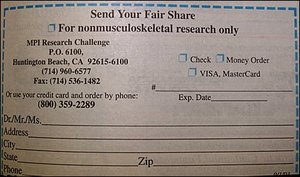In our family, chiropractic care is not there simply to treat musculoskeletal problems. We seek chiropractic adjustments for everything from asthma and allergies to gland inflammation and constipation. That is how we were raised.
This particular DC, a Palmer graduate with over 20 years in practice, was lamenting the current status of chiropractic care for nonmusculoskeletal ailments. He had originally practiced in the Midwest, and observed that since chiropractic gained insurance reimbursement, he saw fewer and fewer cases of patients being cured of somatovisceral problems.
Was this due to the high incidence of third party pay patients in his Southern California practice?
Certainly there's no shortage of cases that medicine can't solve.
How has managed care and third party pay affected the patients you see, what you get paid for, and the way you practice?
Have we acquiesced to the role of musculoskeletal specialists!?
During this advent of national health care, it should be perfectly clear that we are moving more towards a system with gatekeepers and care review. It should also be obvious that only a small portion of those DCs currently practicing can survive with cash practices. "The System" (third party payer) is slowly confining chiropractic to the musculoskeletal realm.
How can we operate within "The System" and still get the good results that we know happen under chiropractic care? How do we prevent "The System" from relegating us to back doctors?
We cannot continue to sit and watch the erosion of the practice of chiropractic. Unless we all take a PRO-ACTIVE position, we will become back doctors.
To be reimbursed in the era of accountability and economic efficacy, we must demonstrate our benefit. This requires a three-pronged approach:
DON'T STOP DOING IT! No, this is not a suggestion of irresponsible health care. But even if you aren't going to get paid for it by the insurance company, provide care for those patients that in your clinical judgment have a strong potential for results. If we stop treating the public for asthma, they will forget how effective we are.DOCUMENT! As long as you are going to treat the person, put together a case study. This isn't hard to do, and, if published, will act as an initial database for the documentation necessary to gain reimbursement. (If you need specific information on how to do a case report, please call Dana Lawrence, DC, at 708-268-6524, he has volunteered to help all DCs that take our future seriously.)
DONATE FOR SPECIFIC RESEARCH! It is very simple. If you want to get paid for it, we have to show what we can do. In this day, that means viable research. Unless of course you like the idea of being a back doctor.
As Bill Meeker, DC, MPH, president of the Consortium for Chiropractic Research said:
"Outcomes management is a central concept in managed care. That means that only those health care procedures that have been scientifically demonstrated to be beneficial to patients will be paid for. The profession has a responsibility to demonstrate that we benefit patients with conditions other than musculoskeletal. The Consortium is actively involved in developing and conducting clinical research in the nonmusculoskeletal area as well as other areas. This is the time when we need the profession's support for this important research."The erosion continues ... unless you do something to stop it.
If everyone gave just $25, much of the research we need could be accomplished. Your fare share is just $25, just a couple of office visits.
Isn't the future of your practice worth it? The future of our profession?
Please call now, toll free, (800) 359-2289 or send you check with the coupon below. Tell the operator you want your donation to be set aside for nonmusculoskeletal research. Your patients both now and in the future will be so glad you gave.
DMP Jr., BS, HCD(hc)

Click here for more information about Donald M. Petersen Jr., BS, HCD(hc), FICC(h), Publisher.





